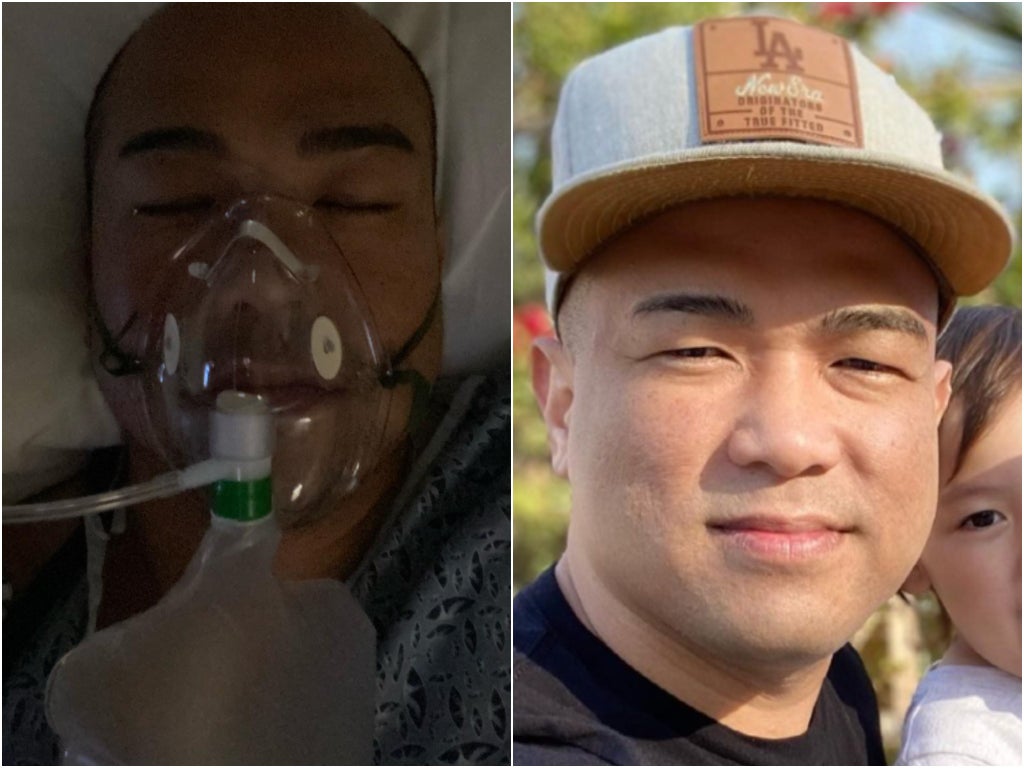
The comedian known as “Chinese Best Friend” shared his regret at not getting vaccinated before he died from Covid-19.
The Los Angeles father texted family members, saying “I can’t breathe again”.
Christian Cabrera, 40, tested positive for the coronavirus around Christmas. Not long afterwards, he was in an emergency room with pneumonia in both lungs. Losing the ability to breathe on his own, he was put on a ventilator. He spent more than a week in the ICU.
“I really regret not getting my vaccine,” he texted his brother, according to KTLA. “If I can do it all over again I would do it in a heartbeat to save my life. I’m fighting for my life here and I wish I [had] gotten vaccinated.”
He also communicated with his friend and fellow comedian Michael Blackson, who posted updates about his comedy companion on social media.
“My Chinese Best Friend who is actually my best friend and right-hand man is in the hospital with Covid and pneumonia on a breathing machine. Please keep him in your prayers,” Mr Blackson tweeted on 11 January.
“I’m not here to promote this vaccination, I really didn’t give two shits about it either but if you are unhealthy like bad lungs and etc go get vaccinated because it will help you stay alive if you catch it,” he added on 13 January.
“My Chinese Best Friend is in the hospital and using an oxygen tank to breathe, he smokes a lot of cigarettes and he knew his lungs were bad now he has Covid pneumonia in his lungs. If he would [have] got vaccinated it probably won’t be as bad. Let’s keep praying for him.”
On 22 January, Mr Cabrera died. His family shared the tragic news on a GoFundMe raising money for his three-year-old son, Noel.
“We are very sad to announce that our beloved brother Christian Cabrera … has lost his battle with Covid pneumonia and passed away tonight,” Mr Cabrera’s brother, Jino Cabrera, wrote in the fundraiser.
“He touched so many people’s lives because he was a very loving, kind, generous, caring person with a beautiful heart and soul.”
“This is absolutely the worst day of my life. Rip,” Mr Blackson tweeted on the day of Mr Cabrera’s death.
On Instagram, Mr Blackson added: “According to the hospital, he took his oxygen mask off to go to the bathroom and passed out, they put him on a ventilator. A few hours later he’s gone. Unbelievable. We were just texting last night and now he’s no longer here. Met him less than 4 yrs ago and we became best friends immediately, he was so young and so caring. No one can ever make me laugh like him. What a tragedy for his fiancé, his kids and his family. I’m out of words. Thanks for all the support but the worst has happened.”
Even before Mr Cabrera’s death, his brother said, he worried he might not survive.
“He keeps saying, ‘Please take care of my son,’” Jino told KTLA last Thursday. “He knows he might not make it. He might die in there.”
Covid cases in Los Angles are currently dropping from their Omicron-era peak, but they’re still extremely high. As of 24 January, the city was facing an average of almost 33,000 new infections per day. And on 20 January, just two days before Mr Cabrera died, LA County reported 102 deaths from the virus in a single day – the highest number in a year.
The seven-day average of daily new cases in LA County on 27 January was 28,717. The seven-day average of deaths on the same day was 62, according to data from The New York Times.
As in the rest of the country, the worst outcomes have been among the unvaccinated. According to LA’s Department of Public Health, unvaccinated LA residents have been six times more likely to end up in an ICU than someone fully vaccinated, and 25 times more likely than a fully vaccinated person who’d also received a booster.
“Our hearts go out to everyone mourning the loss of a loved one as we are once more witnessing the utter misery caused by Covid,” Dr Barbara Ferrer, the city’s public health director, said last week.
“Let’s not fool ourselves by not recognising the danger presented by the Omicron variant, which is capable of spreading with lightning speed and causing serious illness among our most vulnerable residents.”







